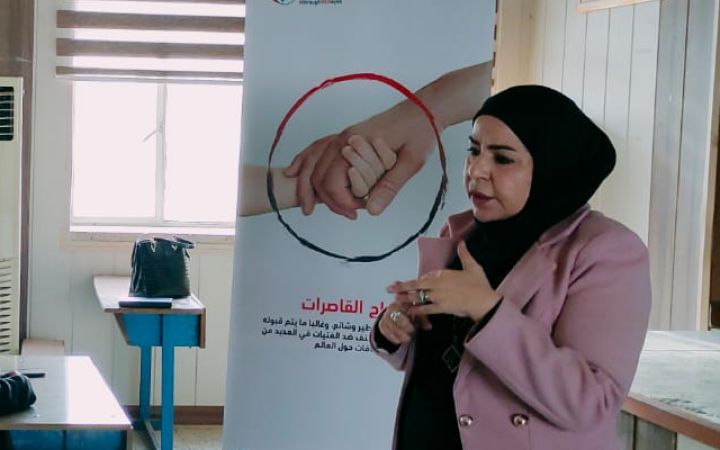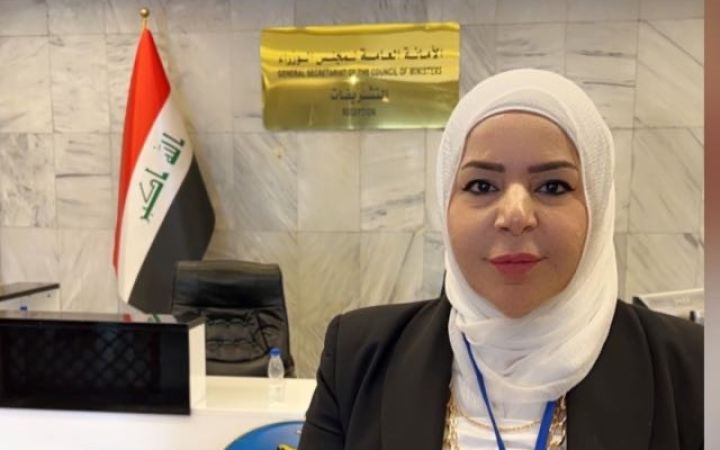- Alia Abbas is the director of the Community Development Division in the Iraqi Ministry of Health. She works tirelessly on raising awareness for women’s issues through Iraq’s primary healthcare centres.
- UNITAR Division for Prosperity launched the fourth phase of its Gender Equality and Women Empowerment programme in 2024, teaching participants leadership and communication skills.
- Alia learned how to manage her team effectively, which in turn had a positive effect on the skills of her staff.
8 November 2024, Hiroshima, Japan - When asked about her personal goal for women in Iraq, Alia Abbas’s answer is prompt and simple: “Make them happy!” Having worked in the public health sector for 31 years, Alia has dedicated her entire career to achieving just that. The UNITAR Gender Equality and Women Empowerment programme taught Alia how to manage her team effectively, which in turn boosted the skills level of her staff.
INSTITUTIONAL CAPACITY FOR WOMEN’S RIGHTS IN HEALTH
Alia Abbas is the director of the Community Development Division in the Iraqi Ministry of Health. She works tirelessly on raising awareness for women’s issues in Iraq’s primary healthcare centres. The primary healthcare centres offer free services to Iraq’s diverse communities, reaching even those living in remote villages. Alia’s section trains staff in these centres on issues like human rights and violence against women.
Her commitment is all the more needed as Iraqi women still face many challenges in their personal and professional lives. Iraq ranked 154th out of 156 countries in the Global Gender Gap Report 2021. Topics such as violence against women remain sensitive in Iraq: according to a 2022 UNFP survey, 52 per cent of Iraqi women keep silent about domestic violence and do not inform anyone about it.
Because of this, ensuring that the primary healthcare centre staff are well-trained is crucial. The centres offer survivors of domestic violence a complete package that consists of treatment, psychological support and logistical services. They also set up an external referral system where they direct women to hospitals, NGOs or the police.
The countries’ institutions have been weakened by many years of war in Iraq, and many NGOs are active in filling the gaps. However, Alia is not sure whether relying on NGOs is a long-term solution; such organizations could easily leave as the situation in the country changes. Alia therefore believes that cooperation among public institutions to address violence against women is crucial.
Alia has seen some improvements. Within her own department, she lists health empowerment, mother-child care as well as vaccination and labour programmes as important areas to promote women’s empowerment in the future.
TAKING SKILLS TO THE NEXT LEVEL WITH UNITAR
In 2023, Alia joined the third phase of the UNITAR Gender Equality and Women Empowerment programme with 35 other participants from Jordan, Lebanon and Iraq who are decision-makers in their countries. The programme aimed to build the participants’ leadership skills, as well as their advocacy and communication capabilities, so that they can better implement gender equality through their work.
Participants have undergone self-paced online modules, webinars with experts, group discussions and peer reviews as well as mentoring and networking sessions. Working in country teams, they developed concrete action plan on an existing gender-mainstreaming initiative in their ministry/country.
Through training on tools like SWOT analysis, Alia gained a better understanding of the strengths and weaknesses in her own programme. After the UNITAR programme, she shared her findings with her managers, including detailed information for future improvements. Alia also trained her staff and, as a result, they can now provide better services to their communities.
She highlights that there are many different paths to promote women’s empowerment. Women’s empowerment could take place through health care, logistics, funding and supporting women in the workplace. What’s important to Alia is to get started, even with small steps.
Her message is simple: “No violence, under any reason”.
ABOUT UNITAR
The United Nations Institute for Training and Research (UNITAR) is a dedicated training arm of the United Nations. In 2023, UNITAR trained over 540,000 learners around the world to support their actions for a better future. UNITAR has a global presence, with offices in Geneva, Hiroshima, New York and Bonn and networks around the world. Find out more at https://unitar.org .



